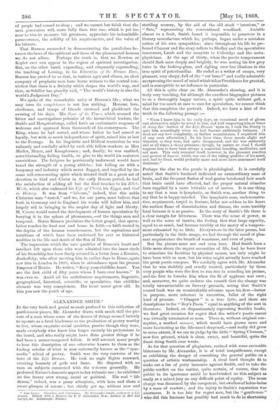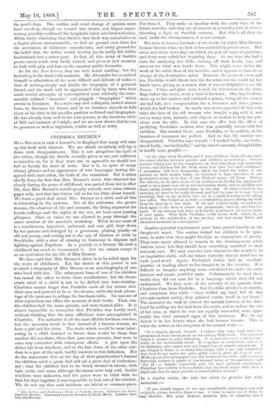ALEXANDER SMITH.
Ix the very fresh and genial memoir prefixed to this collection of posthumous pieces, Mr. Alexander draws with much skill the pic- ture of a man whose sense of the fitness of things seemed latterly to operate as a fatal hindrance to the production of poetry worthy to live, whose exquisite social qualities, passive though they were, made everybody who knew him forget entirely his pretensions to the laurel, and who really might have done greater things if he had been a sourer-tempered fellow. It will astonish many people to hear this description of one otherwise known to them as the leading scholar of what is now universally known as the "spas- modic " school of poetry. Smith was the very converse of the hero of the Life Drama. He took no eagle flights sunward, croaking hoarsely of gods and fame. He disputed with no man on subjects connected with the universe generally. He preferred Nature's domestic aspect to her volcanic one ; he exhibited no fine frenzy over wrong, social or political. His real " life drama," indeed, was a prosy afterpiece, with here and there a sweet glimpse of nature ; but chiefly got up, without new and • Last Leaves. Sketches and Criticisms. By Alexander Smith, author or A Life Drama. Edited, with a Memoir, by P. P. Alexander, M.A., Author of Mill and Cailyle,&e. Edinburgh: Nimmo.
startling scenery, by the aid of the old stock " interiors," or " flats," representing the conventional woodland. Amiable almost to a fault, Smith found it impossible to persevere in a literary manufacture which he, perhaps, began under a mistaken notion of his own sympathies ; since throughout his life he pre- ferred Chaucer and the story-tellers to Shelley and the speculative innovators, Lamb and the essayists to Coleridge and the meta- physicians. At the age of thirty, when the poetic temperament should flash most deeply and brightly, he was noting his few grey hairs in the looking-glass, and sighing over lost illusions in the true spirit of paterfamilias. He ended as a writer of essays, very pleasant, very sleepy, full of the " cui bone?" and really admirable as expressing the mood of mind which takes Providence for granted, and is susceptible to no influence in particular.
All this is quite clear on Mr. Alexander's showing, and it is truly very touching, for although the excellent biographer pictures to us a thoroughly happy nature, a spirit quite without gall, a mind far too much at ease to care for speculation, we cannot think that this completes the portrait. Indeed, we have a hint of the truth in the following passage :-
"When I knew him in his early days, an occasional mood of gloom and abstraction might be noted in him, and half suspecting him at times of doing the Author of the Life Drama' upon us, I took the liberty to quiz him accordingly when we had become sufficiently intimate. (I need not say how completely, on farther acquaintance, I acquitted him of any such affectation.) In his later time, these moods slight and transient as they were, had quite disappeared, and his was eminently and at all times a cheery presence; though, by nature au fond, I should suppose him to have been always a somewhat brooding, meditative, and sad man. This only revealed itself, however, in the pleasant reaction and protest of humour, which was one of the ruling qualities of his mind, and, bad he lived, would probably more and more have announced itself dominant."
Perhaps the clue to the puzzle is physiological. It is carefully noted that Smith's forehead indicated an extraordinary mass of brain, and the frequent flashes of real genius betokened how much that brain could have effected, had the proper natural stimulus been supplied by a more irritable set of nerves. It is one thing to say that a man is lymphatic, as Smith was, another thing to say that he is happy-minded. The lymphatic man, undemonstra- tive, acquiescent, torpid in feature, hides not seldom in his heart the restless flame of dissatisfaction and disease, the more terribly fatal because it is so passive. In the story of Smith's life there is a clear margin for bitterness. There was the sense of power, as well as the sense of inertia, the feeling that that large capacity, equal to so much, had become terribly at the mercy of a tempera- ment exhausted by so little. Everywhere in the later poems, but particularly in the little essays, we feel through the mood of plea- sant acquiescence the breath of weariness, and even of pain.
But the picture must not end even here. Had Smith been a little more above the urgent necessities of life, had he been freer to stimulate his faculties by physical means, not only might he have been with us now, but his voice might actually have reached the great poetic compass. We cordially agree with Mr. Alexander that he was shabbily and cruelly treated, particularly by those very people who were the first to run riot in sounding his praises, and the first to forsake him when the fit of applause was over; and, moreover, we quite endorse the remark that the change was totally unwarrantable on literary grounds, seeing that Smith's second book was an unmistakable advance upon his first—better in purpose, more coherent in execution, fuller of the right kind of promise. " Glasgow " is a true lyric, and there are descriptions in the "Boy's Poem " equal to anything of the sort in literature. Indeed, on dispassionately reperusing Smith's books, we find great occasion for regret that the writer's poetic career was virtually terminated so soon. There is, without original con- ception, a marked manner, which would have grown more and more fascinating as the life-mood deepened,—and really did grow to some extent, if we are to judge by the little " Spring Chanson," now first printed, which is clear, sweet, and beautiful, quite the finest thing Smith ever wrote.
As for that question of plagiarism, revived with some excusable bitterness by Mr. Alexander, it is of total insignificance, except as exhibiting the danger of consulting the general public on a question of artistic workmanship. A rival bard thought fit to make out a list of petty larcenies against Smith, and to take the public verdict on the matter, quite certain, of course, that the public in its ignorance could be hoodwinked on this subject as easily as a mixed jury on any difficult point of equity. The mean charge was dismissed by the competent, but swallowed holus-bolus by a mass of readers ; and the injury to Smith's reputation was enormous. It is too late for regret now, but the " gentleman " who did this business has possibly had much to do in shortening the poet's days. The sudden and cruel change of opinion must have cut deep, though no wound was shown, and disgust super- vening, possibly confirmed the lymphatic habit into fatal reticence. While freely admitting that Smith's first book was assimilative to a degree almost unwarrantable, we find no ground even there for the accusation of deliberate manufacture, and every ground for the belief that the writer would develop (as he really did within limitations) into a minor poet. In fact, all this story of Smith's poetic career reads very badly indeed, and gives us new occasion to look with pity and fear on the sunniest public favourite.
As for the Last Leaves, they are well worth reading; but the best thing in the book is the memoirs. Mr. Alexander has acquitted himself to admiration of the most difficult and delicate of tasks,— that of writing simply and kindly the biography of a personal friend, and his work will be appreciated best by those who have made similar attempts, or contemplated most critically the innu- merable inflated " memoirs." and priggish " biographies " which swarm in literature. In a style easy and colloquial, indeed almost loose, he discusses his theme, and in no instance exceeds or falls short of his duty in his peculiar position as friend and biographer. He has already done well in his own person, as the facetious critic of Mill and imitator of Carlyle, and we are now shown that he can be generous as well as ingenious, tender as well as witty.































 Previous page
Previous page